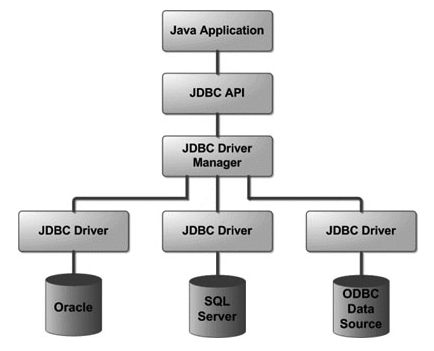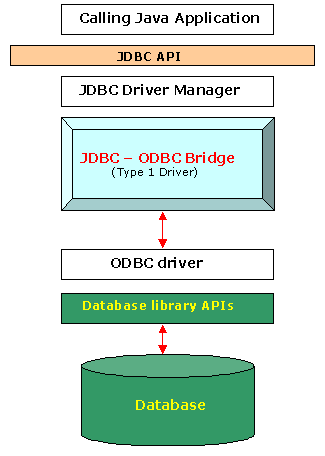JDBC
Java Database Connectivity
It is an API for the connection between Java programming language and Databases.
JDBC Architecture

- JDBC API: This provides the application-to-JDBC Manager connection.
- JDBC Driver API: This supports the JDBC Manager-to-Driver Connection.
What is JDBC Drivers
A JDBC driver is a software component enabling a Java application to interact with a database.
Type 1 Deiver: JDBC-ODBC Bridge (JDK)

Flow: .class(byte code) -> JDBC -> ODBC -> DB
JDBC API
Packages
- java.sql
- javax.sql
It describes the model of Common JDBC Components (Objects)
Connection <- DriverManager -> Driver <-> DB
|
input -> Statement
processing...
output <- ResultSet
Driver
- This interface handles the communications with the database server. You will interact directly with Driver objects very rarely. Instead, you use DriverManager objects, which manages objects of this type.
DriverManager
Connection getConnection(String, String, String)
Connection
- This interface with all methods for contacting a database. The connection object represents communication context, i.e., all communication with database is through connection object only.
Statement createStatement()PreparedStatement prepareStatement()commit()rollback()
Statement
- You use objects created from this interface to submit the SQL statements to the database. Some derived interfaces accept parameters in addition to executing stored procedures.
boolean execute()int executeUpdate()ResultSet executeQuery()
ResultSet
- These objects hold data retrieved from a database after you execute an SQL query using Statement objects. It acts as an iterator to allow you to move through its data.
boolean next()int getInt()
SQLException
- This class handles any errors that occur in a database application.
Connect to Database Steps
Step 1
- Add ojdbc jar
- Import jdbc packages
Step 2
- Register jdbc driver
- Open a connection
- Execute a query
- Extract data from result set
Step 3
- Clean up the environment
http://www.tutorialspoint.com/jdbc/jdbc-sample-code.htm
Examples
connect db, update db
import java.sql.*;
public class JDBCDemo {
Connection conn;
public Connection connectDB() {
// register jdbc driver
try {
Class.forName("oracle.jdbc.driver.OracleDriver");
} catch(ClassNotFoundException ex) {
System.out.println("Error: unable to load driver class!");
System.exit(1);
}
// connect to db
String URL = "jdbc:oracle:thin:@localhost:1521:XE";
String USER = "hr";
String PASS = "123";
try {
Connection conn = DriverManager.getConnection(URL, USER, PASS);
System.out.println("connect successfully :)");
return conn;
} catch (SQLException e) {
e.printStackTrace();
}
return null;
}
public void closeDB() {
try {
conn.close();
System.out.println("connection closed, bye...");
} catch(SQLException e) {
e.printStackTrace();
}
}
public void updateData() {
PreparedStatement ps;
try {
ps = conn.prepareStatement("UPDATE books SET price=?");
ps.setDouble(1, 120.00);
//ps.setString(2, "Java");
int count = ps.executeUpdate();
System.out.println(count + " rows updated!");
ps.close();
} catch(SQLException e) {
e.printStackTrace();
}
}
public void selectData() {
if(conn != null) {
try {
Statement st;
ResultSet rs;
st = conn.createStatement();
rs = st.executeQuery("select * from books");
ResultSetMetaData rsmd = rs.getMetaData();
int count = rsmd.getColumnCount();
for(int i=1;i<=count;i++) {
System.out.print(rsmd.getColumnName(i) + "\t");
}
System.out.println();
while(rs.next()) {
for(int i=1;i<=count;i++)
System.out.print(rs.getString(i) + "\t");
System.out.println("\n");
}
rs.close();
st.close();
} catch (SQLException e) {
e.printStackTrace();
}
}
}
}
createTable()
public void createTable() {
if(conn != null) {
Statement st;
try {
st = conn.createStatement();
st.execute("CREATE TABLE books (bid number, title varchar(15), price number(8,2))");
System.out.println("Table is created!");
int num = st.executeUpdate("INSERT INTO books VALUES (1, 'Java', 123.45)");
num = num + st.executeUpdate("INSERT INTO books VALUES (2, 'C++', 22.12)");
num = num + st.executeUpdate("INSERT INTO books VALUES (3, 'JSP', 34.56)");
System.out.println(num + " rows inserted!");
st.close();
} catch (SQLException e) {
e.printStackTrace();
}
}
}
main()
public static void main(String args[]) {
JDBCDemo db = new JDBCDemo();
db.conn = db.connectDB();
//db.createTable();
db.updateData();
db.selectData();
db.closeDB();
}
